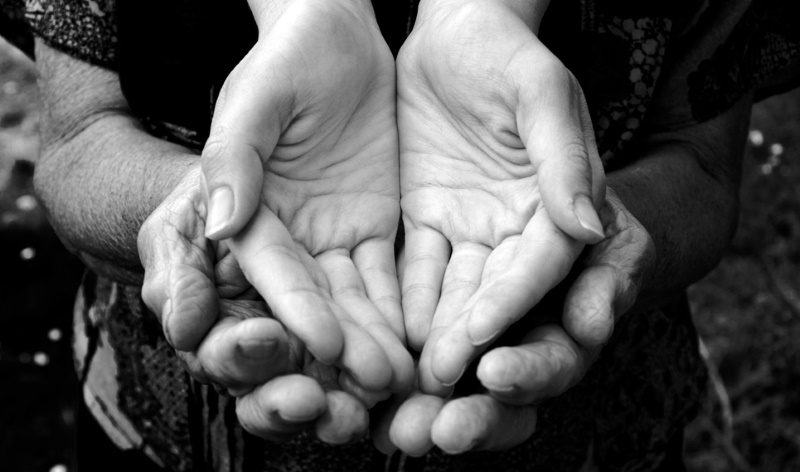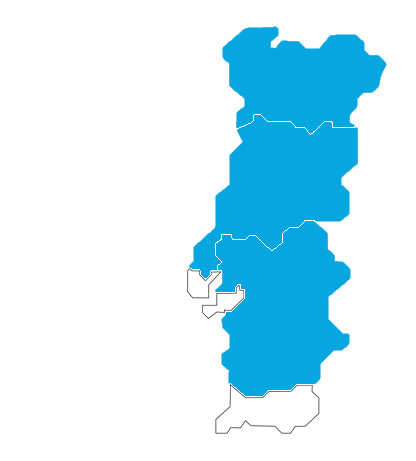Axis 3

Promoting Social Inclusion and Combating Poverty and Discrimination
Inherent in thematic objective 9 (TO9), Priority Axis 3 seeks to promote social inclusion and combat poverty and discrimination through the Investment Priorities:
-
9.i Active inclusion
Contributes to Specific Objective 3.1. Promote skills to potentially vulnerable groups, through the Typologies of Operations:
| Designation | Objectives | |
|---|---|---|
| 3.01 - Qualification of persons with disabilities and/or disabilities | Promotion of actions that enable the acquisition and development of professional skills, with a view to enhancing the employability of people with disabilities, geared to the exercise of an activity in the labour market. | |
| 3.02 - Support for the employment of persons with disabilities and/or disabilities | The actions financed aim to provide persons with disabilities with the possibility to pursue a professional activity, under special conditions and, in this way, to enhance the development of skills that allow them to make the transition to the normal working regime. | More information |
| 3.03 - Modular training for DLD | Actions that promote the inclusion of audiences who have been away from the labour market for a longer time and who, because they are low-skilled, go through processes of demotivation and loss of skills that make it difficult to participate in working life and to integrate themselves into active employment measures for the unemployed, in particular in sustained processes of professional qualification, enhancing a faster and sustained return to the labour market. | More information |
| 3.04 - Active Life for DLD | It aims to enhance the quality and speed of active employment measures for the long-term unemployed, in particular vocational qualification, and to enhance a more sustained return to the labour market by: (i) participation in modular training pathways tailored to their profile and needs, (ii) practical on-the-job training and (iii) recognition, validation and certification processes of skills acquired throughout life through formal or informal, professional or dual certification pathways. | More information |
| 3.05 - Empowerment for inclusion | Set of actions that aim to promote the empowerment of potentially vulnerable groups, focusing mainly on the development of personal and social skills. | More information |
| 3.06 - English for All | Promote the learning of the language by foreign citizens, ensuring the certification of the acquired knowledge and facilitating the integration process. | More information |
| 3.08 - Socio-occupational integration of the Roma community | Develop sufficiently flexible responses to incorporate innovative methodologies that allow for personalised follow-up and the different actors involved in the labour integration process. | More information |
Contributes to Specific Objective 3.2. Strengthening social cohesion through the Typologies of Operations:
| Designation | Objectives | |
|---|---|---|
| 3.09 - Intercultural municipal mediators project | Promote the integration of marginalized audiences, based on the principles of mediation, interculturality and community intervention, privileging the training and hiring of mediators from the target communities. | |
| 3.10 - Local Social Development Contracts (CLDS) | They aim to promote the social inclusion of individuals in a multisectoral and integrated way, through actions to be implemented in partnership, which can contribute to increasing employability, combating critical situations of poverty, especially child poverty, and social exclusion in vulnerable, ageing or severely disaster-stricken territories, while paying particular attention to implementing measures that promote the active inclusion of persons with disabilities. | |
| 3.11 - Choices Program | Promote the social inclusion of children and young people from vulnerable socio-economic backgrounds, aiming at equal opportunities and strengthening social cohesion, prioritising immigrant descendants and Roma communities. | More information |
Contributes to Specific Objective 3.3. Promote a volunteer booster of social inclusion, through the Typologies of Operations:
| Designation | Objectives | |
|---|---|---|
| 3.12 - Specialised volunteering fellowship | Tool to systematize the available offer and certification of entities, with social intervention, promoters of volunteering. | |
| 3.13 - Training and awareness-raising for Continuity Volunteering | Training actions for continuity volunteering in the areas promoting social inclusion and awareness-raising actions, as a guarantee of information regarding the rights and duties of a volunteer. |
-
9.iii Equal opportunities
Contributes to Specific Objective 3.4. Promote equal opportunities and gender, through the Typologies of Operations:
| Designation | Objectives | |
|---|---|---|
| 3.14 - Awareness-raising and campaigns | Promotion of awareness-raising, information and dissemination campaigns on gender equality and the prevention of gender-based violence, domestic violence, trafficking in human beings, the fight against racial discrimination, addictive behaviours and related issues. | |
| 3.15 - Training of strategic audiences | They aim at the qualification of professionals who perform skills, in the most diverse areas (e.g. justice, security forces, health, education, social security, etc.), in areas associated with the promotion of equal opportunities and gender, combating discrimination, domestic and gender-based violence and trafficking in human beings and providing specialised support and follow-up to victims and aggressors. | |
| 3.16 - Financial and technical support to non-profit civil society organisations | They aim to consolidate the relevant role that NGOs and other non-profit civil society entities play among populations, vulnerable groups, victims and perpetrators in the fields of promoting gender equality, preventing and combating discrimination based on sex and sexual orientation, preventing and combating domestic and gender-based violence (including female genital mutilation), and preventing and combating trafficking in human beings. | More information |
| 3.17 - Specific instruments for protecting victims and accompanying aggressors in domestic violence | It is complemented by the use of innovative technological means that effectively guarantee the safety of victims of domestic violence, including the use of a surveillance system through electronic means as a means of controlling the measure of removal of the aggressor of the victim. | More information |
-
9.iv Access to sustainable services
Contributes to Specific Objective 3.5. Expand the offer of social and health services, through the Typologies of Operations:
| Designation | Objectives | |
|---|---|---|
| 3.18 - Models to support independent living (MAVI) | It is intended to stimulate new models of intervention and service delivery that introduce greater effectiveness and efficiency in the process of qualification and rehabilitation, in particular by proximity to their life context. | |
| 3.20 - Age + | Programme for the diversification of services that promote quality of life, the well-being of the elderly and active and healthy ageing. | More information |
| 3.23 - Local social intervention network (RLIS) | Model of organization and functioning of place-based social intervention in which it is intended to support the processes of care, referral and social monitoring of people and families at risk and socio-economic vulnerability. | More information |
| 3.24 - Qualification of the national early childhood intervention system | This intervention aims to consolidate the national system of early intervention in childhood (SNIPI), in order to leverage the resources and integrated and decentralised actions of services and ensure a greater coverage and better quality of responses to the multidimensional and specific needs of eligible children and their families, with a view to their social inclusion. The actions to be financed are aimed at the qualification of technicians and the strengthening of the network of local intervention teams. | More information |
| 3.25 - Support for positive parenting | The actions proposed in this context aim to improve the responses to support the empowerment of families to exercise responsible parenthood, through the strengthening and acquisition of parental skills necessary for the guidance and education of children and young people, ensuring their adequate development. | More information |
| 3.27 - National Immigrant Support Centers | The actions aim to continue the ‘one-stop-shop’ methodology advocated by Portugal and recognised at national and international level as a good practice in the reception and integration of immigrants, allowing the different public entities with competences in their integration process, in partnership with civil society entities, in particular immigrant associations, to work in the same space targeted to their specific needs (CNAI). It is intended to finance the hiring of sociocultural mediators, many of them with migratory paths, by civil society entities that collaborate in these centers, ensuring close care in the mother tongue of users. | More information |
| 3.28 - Training of Teachers, Technicians and Other Professionals of CPCJ | It aims to support actions aimed at strengthening the functional capacity and human capital of the Commissions for the Protection of Children and Youth in their preventive and restorative intervention in situations of risk and danger to children and young people, with an impact on promoting social inclusion and combating child and family poverty. | More information |
| 3.29 - Training of Rehabilitation Technicians | Qualification actions of technicians involved in the area of integrated policies for the professional rehabilitation of people with disabilities, who need to acquire and/or update knowledge and skills transversal to the process of socio-professional integration of these audiences, through the support of vocational training and awareness actions. | More information |
| 3.30 - Training of Healthcare Professionals | Skills development actions necessary for the professional performance of health assets compatible with the requirements arising from the modernisation of the health system and in particular with the focus on diversification and improvement of the quality of the responses of the respective services. | More information |
-
9.v Social Entrepreneurship
Contributes to Specific Objective 3.6. Promote entrepreneurship and social innovation through the Typologies of Operations:
| Designation | Objectives | |
|---|---|---|
| 3.32 - Capacity-building programme for social investment | Funding of capacity-building activities for innovation and social entrepreneurship organisations through vouchers allocated to final recipients. | |
| 3.33 - Impact Partnership Programme | financing initiatives and investments in innovation and social entrepreneurship promoted by social economy organisations and/or small social mission enterprises, through medium-term grants in tranches with mentoring and monitoring of results. | |
| 3.34 - Social Impact Bonds | Financing of innovative solutions in the provision of public services, conditioned and proportional to the results achieved in reducing costs without decreasing the quality of performance. | More information |
| 3.36 - Institutional Training of Social Economy Partners Members of CNES | Creation of conditions for the promotion of networking, at national and European level, with a view to exchanging experiences and disseminating good practices, as well as the creation of social economy support offices with helpdesks. | More information |
| 3.37 - Training-Action for Social Economy Entities | It aims to support the empowerment of social economy entities through the use of the action-training modality, allowing to respond to very specific and concrete needs of this sector, namely in key areas such as quality and efficiency in the management and implementation of tools such as internal control, risk management, conflict of interest, public procurement, ethics and transparency, among others. | More information |
| 3.38 - Higher Education Scholarship for Deprived Students | To award higher education scholarships to students with financial difficulties, who successfully attend the various higher education formations (in a polytechnic environment or in a university, public or private teaching environment). The aim is to combat school drop-out by allowing drop-out students to return to education and training in a higher education context. | More information |
Areas of Coverage

Planned funding:
European Social Fund - 1.728.280.000 €
National contribution - 207.931.765 €
Targets for 2023:
- 39,700 Participants with disabilities and disabilities in vocational rehabilitation actions
- 783.600 Participants from disadvantaged groups, including low-skilled DLDs, in certified modular training
- 93.900 Participants from disadvantaged groups in training pathways
- 5,200 supported projects to diversify the supply of health and social services and increase the quality of available health and social responses
This page has been translated automatically using a translation tool.


